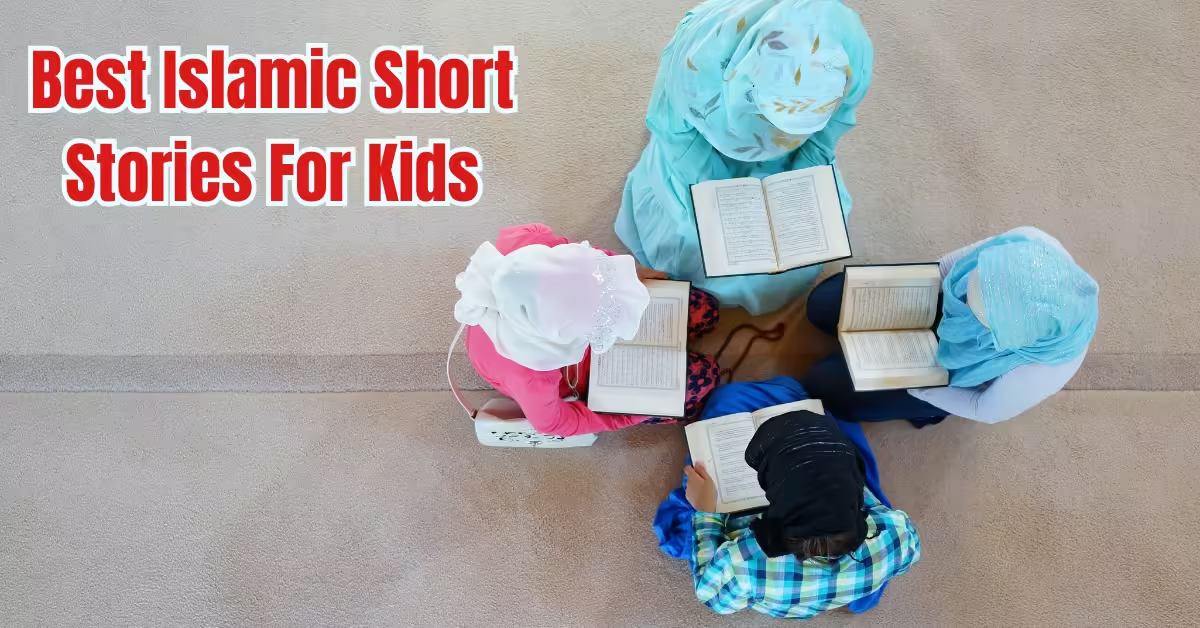Islam provides many ways to address the worries we face in life, especially when it comes to raising our children. As parents, there’s little that concerns us more than ensuring a good upbringing for our kids. Fortunately, Islam offers various paths to help guide us through this journey.
One of the most engaging and effective ways to teach our children valuable life lessons is through storytelling. Instead of giving direct instructions, which they might not always listen to, stories can captivate their imagination and subtly instill important morals and values. The power of a well-told story can inspire children to embrace these lessons in a way that feels natural and meaningful to them.
Islamic Moral Stories for Kids:
Thankfully, the rich Islamic heritage offers a wealth of moral stories that are both suitable and enjoyable for children. These stories not only entertain, but also provide valuable lessons that can guide them in their everyday lives. With this in mind, we wanted to share some of the most wonderful Islamic stories in English that you can explore with your children.
The Man and the Dog – An Islamic Moral Story
“The Man and the Dog” is a short Islamic story for kids that teaches the value of kindness and compassion towards animals.
Once upon a time, a man was traveling through the desert. The sun was scorching, and the heat was unbearable. After walking for a long time, the man became exhausted and thirsty, feeling the dryness in his throat. He was desperate to find water.
Eventually, he came across a deep well and quenched his thirst. With his strength restored, he felt hopeful again and continued his journey.
Soon after, he saw a dog struggling in the heat, panting heavily from thirst. The man felt a deep sense of pity, remembering how he had suffered from the same thirst. But there was a problem: the well was too deep for the dog to reach the water.
The man thought for a moment and came up with a solution. He removed his shoe, filled it with water, and brought it to the dog. The dog drank eagerly, fully satisfied.
Later, when the man passed away, Allah, in His mercy, accepted him into heaven. The man’s act of compassion towards the dog was a sign of his pure and kind heart, and it earned him a place in paradise.
This story reminds children of the importance of showing kindness and mercy to all creatures, as such deeds can bring great rewards.
2. The Kindness of Abu Bakr (May Allah be pleased with him)
Once, in the city of Makkah, lived a man named Abu Bakr, a close companion and dear friend of Prophet Muhammad (peace be upon him). Abu Bakr was known for his kindness, generosity, and compassion.
One day, while walking through a bustling market, Abu Bakr noticed an elderly woman struggling to carry her heavy bags of groceries. Her face showed exhaustion, and her hands shook from the weight. Without a second thought, Abu Bakr rushed over to help her.
With a kind smile, he said, “Peace be upon you, dear sister. Let me help you with these heavy bags.” He took the burden from her hands and carried it cheerfully.
As they walked together, Abu Bakr learned that the woman was a widow with no family to support her. She lived alone, and her home was in disrepair, with a leaking roof and crumbling walls. Deeply moved by her situation, Abu Bakr decided to help.
Not only did he assist her with groceries, but he also arranged for her house to be repaired. Gathering workers and providing the necessary materials, he ensured the house was made comfortable and safe once again.
When the woman saw the transformation of her home, tears of gratitude filled her eyes. She thanked Abu Bakr and prayed for him. In his humility, Abu Bakr attributed his actions to the teachings of Islam and the example of kindness set by Prophet Muhammad (peace be upon him).
This story teaches us about the power of kindness, compassion, and the importance of going beyond to help those in need, reflecting the spirit of Islam.
3. The Orphan and Uthman ibn Affan’s Compassion (May Allah be pleased with him)
Once, in the bustling city of Madinah, there lived a young orphan named Abdullah. His parents had passed away, leaving him with no one to care for him. Despite his difficult circumstances, Abdullah was known for his cheerful spirit and kind heart.
The Encounter with Uthman ibn Affan (May Allah be pleased with him)
One day, while playing in the streets of Madinah, Abdullah caught the attention of Uthman ibn Affan, a close companion of Prophet Muhammad (peace be upon him). Uthman was known for his kindness and generosity, and the sight of the orphaned boy deeply moved him.
With a gentle smile, Uthman approached the boy and said, “Peace be upon you, young one. What is your name, and where are your parents?” Abdullah, with sadness in his eyes, explained how he had lost his parents.
Uthman’s heart was filled with compassion. He decided to take Abdullah under his care, treating him not just as a guardian but as if he were his own son. Uthman provided the boy with food, clothing, and a loving home. He also ensured that Abdullah received an education, teaching him important lessons from the Quran and the traditions of the Prophet (peace be upon him).
The Garden of Happiness
Uthman owned a beautiful garden in Madinah, filled with lush greenery and fragrant flowers. He would often take Abdullah there, where the boy found peace and joy in the natural beauty surrounding him.
In this serene setting, Uthman taught Abdullah valuable lessons about gratitude, kindness, and caring for others. He shared stories of the Prophet’s love for orphans and reminded him of the importance of helping those in need.
Under Uthman’s guidance, Abdullah grew into a responsible and compassionate young man. The compassion Uthman showed him not only changed his life but also inspired him to adopt the same values of empathy and generosity.
The Legacy of Compassion
When Uthman ibn Affan passed away, Abdullah carried forward his guardian’s legacy of kindness. He dedicated his life to helping orphans and those in need, spreading compassion and love throughout the community.
This heartwarming story demonstrates the profound impact of kindness and care. The relationship between Uthman ibn Affan and the orphan Abdullah serves as a powerful reminder of the importance of looking after the vulnerable in society and living by the noble principles of Islam.
Ready to deepen your understanding of the Quran? Join Online Learning Center for expert-led Quranic studies and enrich your spiritual journey today!
Visit our website now to learn more and enroll.
4. The Honest Merchant: Abdur Rahman ibn Awf’s RA Integrity
In the bustling marketplace of Madinah, there lived a man named Abdur Rahman ibn Awf RA, a companion of Prophet Muhammad (peace be upon him). Abdur Rahman was not only successful as a merchant but was also widely respected for his unwavering honesty and integrity.
The Lost Goods
One day, while conducting business, Abdur Rahman came across a pouch filled with a large number of gold coins that had been left behind by a customer. Instead of keeping the pouch for himself, the honest merchant immediately set out to find its rightful owner.
He went around the market, asking people and describing the lost pouch in detail. Eventually, Abdur Rahman identified the distressed owner—a fellow merchant who had unknowingly dropped the pouch while managing his goods. The merchant was both shocked and overjoyed when Abdur Rahman returned the pouch to him.
Prophet Muhammad’s Appreciation
The story of Abdur Rahman’s honesty quickly spread, and it reached the ears of Prophet Muhammad (peace be upon him). The Prophet, impressed by Abdur Rahman’s integrity, praised him, saying, “May Allah bless your business and your family.” This heartfelt acknowledgment from the Prophet filled Abdur Rahman with immense joy and honor.
The Generosity of Abdur Rahman
Motivated by the teachings of Islam and his financial success, Abdur Rahman became known for his generosity. He regularly gave in charity, helping those in need and supporting various community projects. His wealth was a means of serving others, and he embraced a life of giving.
The Legacy of Honesty
Abdur Rahman’s story stands as a powerful reminder of the importance of honesty and integrity in both business and everyday life. His commitment to ethical behavior earned him the respect of his peers and the commendation of Prophet Muhammad (peace be upon him).
This story teaches us that true success is not just about wealth but also about maintaining a principled and honest character. Abdur Rahman ibn Awf’s legacy continues to inspire, showing us that honesty and generosity are the hallmarks of a life well-lived, rooted in the noble values of Islam.
5. A Special Baby is Born
Many years ago, more than 1,400 years passed, a man named Abdullah and his wife, Aminah, lived in a city named Mecca in the desert of Arabia. Mecca was a very large city, but it was not very fertile, so caravans came to trade food and supplies for the people of Mecca. A tribe called the Quraish were the ones that brought the caravans to the city, so the tribe was both rich and powerful. Abdullah and Aminah were part of the Banu Hashim clan of the Quraish tribe.
Aminah found out that she was going to have a baby! An angel came to her before the baby was born and told her the special name of her baby boy. She was going to name him Muhammad. Sadly, Abdullah died before Muhammad (as) was born, but Muhammad (as) lived with his mother and grandfather, Abdul Muttalib. On the day that he was born, his grandfather took him to the Ka’bah to pray to Allah and thank him for his grandson!
Ready to deepen your understanding of the Quran? Join Online Learning Center for expert-led Quranic studies and enrich your spiritual journey today!
Visit our website now to learn more and enroll.
6. Story Using Bad Language
Mahmud was a very pious man, but he was not very attractive looking. One day, he was walking along the road, minding his own business, when a lady came up to him, and started calling him names and abusing him. This lady kept saying all kinds of nasty things, and Mahmud just listened to her patiently. Finally, when she was finished calling him names and abusing him, Mahmud just greeted her, smiled, and said
“and a nice day to you,” and continued on his way.
Why did Mahmud, the pious man, behave this way?
It is because he knew that everything she said was just a reflection of her own inner self.
If you use bad language, you are just making obvious to everybody how far away you really are from Allah, since your words are in reality a reflection of your own inner self.
7. Hazrat Hassan Al-Basri (ra) Impresses An Unbelieving Neighbor
Hazrat Hasan al-Basri once fell sick. His neighbor, an unbeliever, came to pay him a visit.
“O Imam,” he exclaimed, “I detect a bad smell.” The Imam told him it was caused by illness, but the neighbor insisted: “That is not the odor of sickness. It is a lavatory smell. For the love of Allah, tell me what it is!”
He had not noticed that sewage was leaking from his house into that of the Imam.
When the neighbor pressed him, the Imam finally said: “For some months your drain has been seeping through to our side. I tried to fix it, but without success.”
His neighbor asked why he had not told him before, but the venerable Imam said: “I might have offended you.”
The unbeliever was so impressed by this ethical refinement that he was ennobled with True Faith, for he recognized the Imam’s morality as a ray of Islam.
Ready to deepen your understanding of the Quran? Join Online Learning Center for expert-led Quranic studies and enrich your spiritual journey today!
Visit our website now to learn more and enroll.
8. The Story of the Woodcutter
Once upon a time a very strong woodcutter asked for a job in a timber merchant, and he got it. The pay was really good and so were the work conditions. For those reasons, the woodcutter was determined to do his best.
His boss gave him an axe and showed him the area where he was supposed to work. The first day, the woodcutter brought back 18 trees.
“Congratulations,” the boss said. “Go on that way!”
Very motivated for the boss’ words, the woodcutter would try harder the next day, but he only could bring 15 trees back. The third day, he tried even harder, but he only could bring 10 trees.
Day after day he was bringing less and less trees.
“I must be losing my strength”, the woodcutter thought. He went to the boss and apologized, saying that he could not understand what was going on.
“When was the last time you sharpened your axe?” the boss asked.
“Sharpen? I had no time to sharpen my axe. I have been very busy trying to cut trees.”
Our lives are like that. We sometimes get so busy that we don’t take time to sharpen the axe. The state of our imaan greatly depends on how much we sharpen it food that feeds the soul. If we go on with our lives too busy to feed our soul, it will lose strength and we will not be motivated to perform good deeds. So, take a moment everyday and “sharpen” your soul by listening to the Quran, lectures, remembering Allah, etc.




